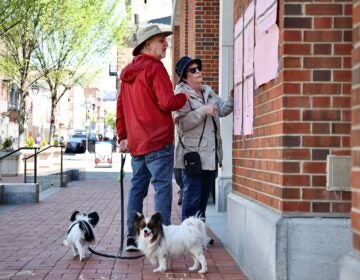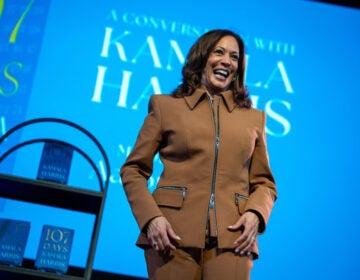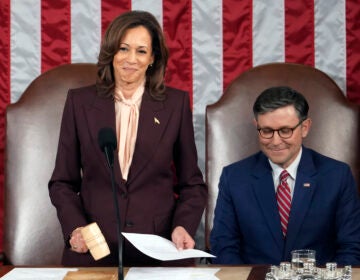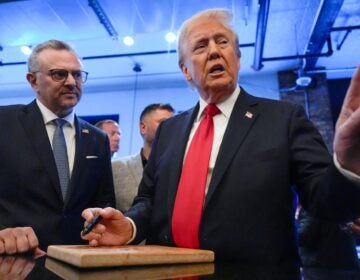BBC debate show host offers her take on presidential election ahead of show taping in Philly
BBC's "Question Time" arrives in Philadelphia to discuss the U.S. presidential election, featuring politicians, commentators, and spontaneous audience questions.
Listen 6:38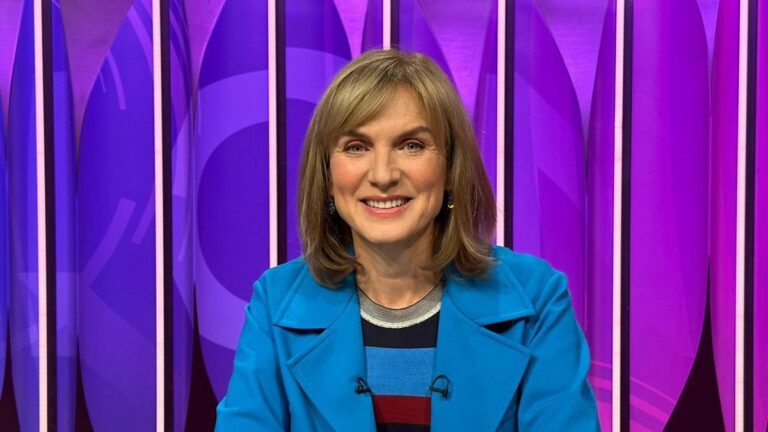
Fiona Bruce, the host of 'Question Time' on BBC One. (BBC)
From Philly and the Pa. suburbs to South Jersey and Delaware, what would you like WHYY News to cover? Let us know!
The BBC’s flagship debate program, “Question Time,” hosted by British journalist Fiona Bruce, will be broadcast from the National Constitution Center in Philadelphia on Wednesday, October 9. This event will focus on the upcoming presidential election, featuring a live audience and panel discussion.
This marks the first broadcast of “Question Time” from the U.S. since 2008, providing viewers in the UK, U.S., and around the world with a unique perspective on the issues that matter to American voters in a critical battleground state, just weeks before the election. Bruce, who has hosted the BBC One program since January 2019, recently spoke with WHYY “Morning Edition” host Jennifer Lynn about Britain’s view on the U.S. presidential race and the distinctiveness of her show.
____
Fiona Bruce: Question Time is a panel show, and we have politicians from opposing parties on it, along with, sometimes, journalists, political commentators, or people in the public eye who are interested in and opinionated about politics. Then, we have an audience that is made up of people, some of whom support one party and some of whom support a different party. So, you get different opinions in the room. We record it live, and we do that every week in different places all around the United Kingdom.
Jennifer Lynn: And you receive questions from the audience. Do you read them ahead of time? Do you choose who’s going to be asking the questions?
FB: Well, we receive questions from the audience when they turn up, which is about an hour before we go to air, so it’s all pretty last minute. You know, what we want to do is reflect what people are thinking there and then. Obviously, stories can change from day to day. The panelists do not know what the questions are. In between the questions, I go back and forth with the audience. People stick their hands up; they might want to ask something else that is relevant to that question. They might want to make a comment. They might want to say, “That sounds like rubbish to me” or “Actually, that policy is not working for me.” It’s pretty lively, and it can be pretty passionate. It reflects what people’s genuine views are.
JL: You seem to know everything. What is your preparation level? What do you go through to get ready for a show?
FB: Well, the thing is, I have been a news journalist; I’ve been a news anchor as well for 25 years. You know, you kind of accumulate a bit of knowledge over those years. I have a fantastic team; there are only about four or five of us — quite small — and we prepare briefs on what we think the subjects might be. For example, at the moment, it’s pretty obvious in the UK that people will want to talk about what’s happening in the Middle East. And obviously, you know, it’s a cumulative thing. But sometimes, people come along with questions, and it’s quite last minute. It might be that lots of people are asking about something we do not expect, and then you’ve just got to go for it, you know. You hope you do know enough to correct things that are wrong, but also just let the conversation flow.
JL: Well, when Question Time is in Philadelphia at the National Constitution Center, the focus will be on our presidential election. Do you know who the panelists are going to be? I would assume you know by now, or is that still getting worked out?
FB: Well, we know most of them. So, we have Madeleine Dean, a Democrat, you know, Pennsylvania Congresswoman. We’ve got Brian Lanza, who’s a senior advisor to Donald Trump and was part of his Communications Team in 2016 as well. We’ve got a British journalist who’s now a U.S. citizen, called Mehdi Hassan. He’s been on the program before; he’s fantastically knowledgeable. We have Anthony Zercher, who’s our BBC America correspondent — a Texan guy who’s fantastically knowledgeable. If there’s anything I don’t know, I’m pretty sure he will know. We did have a Republican politician; he’s just had to pull out for personal reasons related to him. So, we’re just making sure we have a Republican politician on the panel too, because what is crucial is that it is balanced. You know, we are the BBC; that’s a big thing for us, and we need to make sure that both sides of the debate are represented and are fairly heard on the panel, as well as in the audience.
JL: What is the overall view of the US presidential election in Britain regarding the process itself?
FB: Well, I think what is concerning here, and disconcerting, is the undermining of that process and the declining faith in that process. You know, rightly or wrongly, depending on your point of view and which side of that political divide you are. To see what we’re seeing now are the court cases that are already being brought before the thing has even taken place. I know postal ballots have started. We look at that over here and think, “God, that looks a bit scary to us.” The fact that the peaceful transition of power is not a given, or that’s how it appears to us, that’s something we would have ever questioned before. In Britain, obviously, we look to the U.S., as do many countries in the West. As you know, the U.S. is the superpower, and we expect the U.S. to, you know, be a beacon of democracy and stability. So, if it begins to look slightly unstable, that’s alarming. I think that’s the kind of thing we discuss here quite a lot.
JL: Are there any polls in Britain about whether Donald Trump or Kamala Harris would be a better international partner?
FB: I think Trump bemuses many Britons. We don’t really get him. I mean, we have had a right-wing government for the last 14 years; it’s now gone to a left-wing government. A right-wing government obviously has much more in common with the Republican Party. Trump is a unique phenomenon, and one that I think the Brits struggle to get their heads around. Kamala Harris is an unknown phenomenon to us, as much as to many Americans, in that she’s been, you know, Veep for however long, but we haven’t really seen that much of her. There are all sorts of reasons why people want to vote for Trump and vote for Republicans which are not clear to us over here. I want us to be able to understand that properly and clearly because it’s very easy to take a kind of black-and-white view or a rather simplistic view. Of course, it’s much more complex than that, and people have lots of different reasons why they vote the way they do.
JL: Will you spend more than a minute in Philadelphia?
FB: Definitely. We’ve already made plans to run from a hotel up the Rocky Balboa steps and take a picture. You know, it’s got to be done.
JL: Well, listen, thank you for your time and good luck on the program. I think it’s going to be a smashing success.
FB: Oh, lovely to talk to you. Thank you so much.
____
To apply for a spot in Question Time’s studio audience at the National Constitution Center on Wednesday, October 9, visit https://eu.castitreach.com/ag/mentorn/questiontime/welcome.html.
The program will be broadcast on Thursday, October 10th, at 8:00 a.m. EDT / 1:00 p.m. BST on BBC One.

Get daily updates from WHYY News!
WHYY is your source for fact-based, in-depth journalism and information. As a nonprofit organization, we rely on financial support from readers like you. Please give today.



